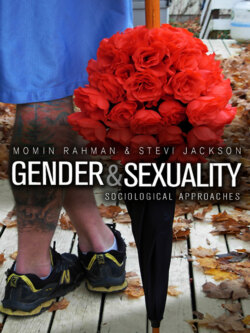Читать книгу Gender and Sexuality - Stevi Jackson - Страница 6
На сайте Литреса книга снята с продажи.
What Do You Think About Same- Sex Marriage?
ОглавлениеIn August 2010, a federal judge overruled California’s Proposition 8, which had been passed in November 2008 during the American Presidential election. Proposition 8 overrode previous court rulings that had, since May 2008, permitted same- sex marriages, but it did not overturn the right to domestic partnerships, which California had enacted in 1999. It is worth reviewing some of the protests and the arguments both for and against same- sex marriage (available online at many news channels). You will see the strength of passion on both sides of this debate and we ask you to consider why it is that the right to marriage is such a trigger for social protest against lesbians and gays. In April 2005, one of your authors – Momin Rahman – attended a demonstration in support of the recent passage of a gay rights bill through the state legislature of Maine, USA. Fifty or so gay rights supporters gathered on the balcony of the capitol building, whilst, below, four or five times the number demonstrated their rejection of the proposed bill. Most of those opposed were religious, and we were told that many of these Christian groups had been bussed in from other states to bolster this show of ‘traditional’ moral values. The clothing of choice for the traditionalists was a t- shirt depicting a male and female figure holding hands, with the slogan that marriage was meant to be between a man and woman.
In fact, the proposed legislation was not concerned with same- sex marriage but with equalization of treatment for lesbians and gays [1]. However, given the controversies surrounding lesbian and gay civil union legislation in the USA, and the salience of this issue in the Presidential election of November 2004, it is perhaps not surprising that the possibility of marriage rights in Maine became the focus for the Christian Right. Furthermore, legislation to recognize same- sex civil unions and/or marriage is a truly global issue, with laws passed or under discussion in many countries worldwide, and always in the context of intense public debate [2].
How can we understand and explain the strength of emotion that the recognition of lesbian and gay marriage provokes? Of course, it could be argued that this particular civil right is the latest in a gradual extension of rights to lesbian and gay minorities, beginning for many in Western Europe and North America in the late 1960s and accelerating in the 1990s with the increasing cultural visibility of diverse sexualities. This trend could be seen as part of wider changes in western society that have also resulted in the advance of rights for women and ethnic minorities. We may then account for the controversy over same- sex marriage as the inevitable but temporary battle between traditionalism and democratic social progress. But is this an accurate picture? We suggest not.
A full understanding of such controversies is not possible without a thoroughly sociological analysis of the social organization of sexuality and gender and their social meaning. What such a perspective entails is discussed in the next section.
